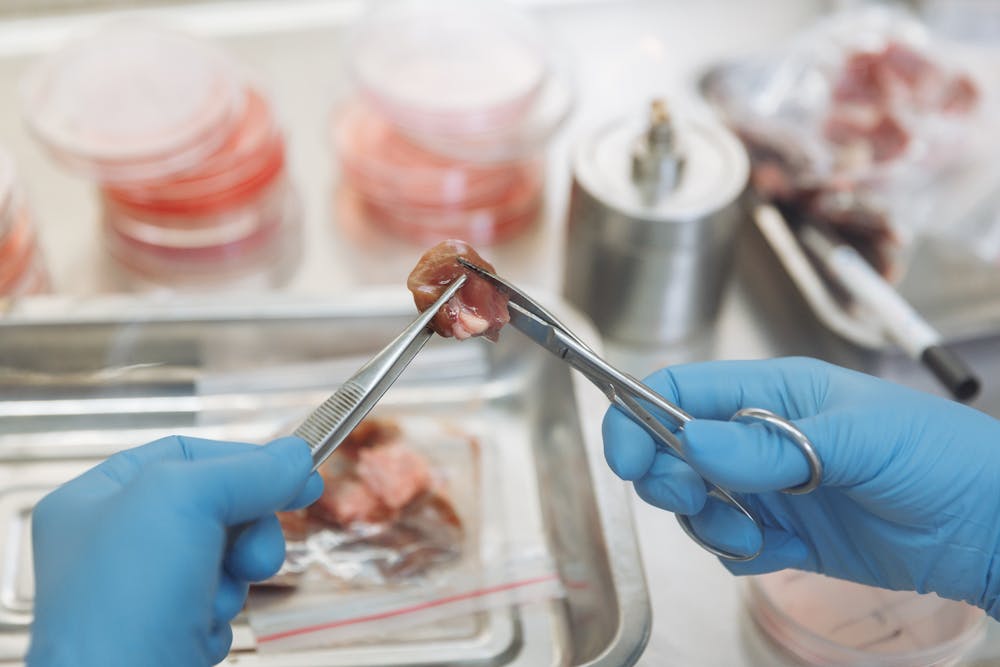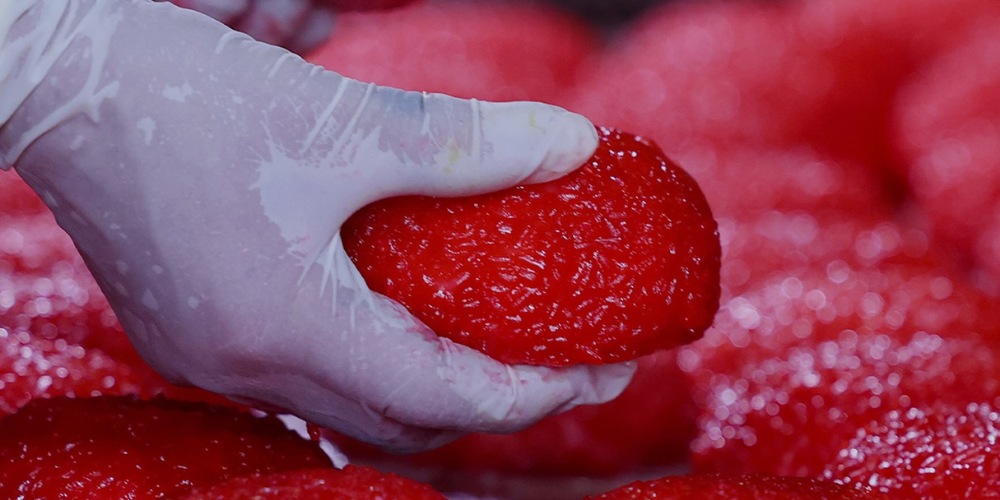As the global quest for sustainable and ethical food sources accelerates, lab-grown meat emerges as a groundbreaking innovation, poised to revolutionize our food system. This technology cultivates meat directly from animal cells. It promises a future where indulging in a steak or burger doesn’t come at the expense of animal welfare or the planet’s health. With the potential to significantly reduce the environmental footprint of meat production and eliminate the need for animal farming, lab-grown meat is drawing attention worldwide. However, it faces challenges, including consumer skepticism and technical hurdles, that must be navigated to fulfill its promise. This article will explore the ins and outs of lab-grown meat.
What Is Lab-Grown Meat?
Lab-grown or cultured meat is created from animal cells without raising and slaughtering animals. Scientists start with a small sample of cells and then nurture them in a lab until they grow into edible meat. This process aims to mimic the taste and texture of traditional meat but more sustainably and ethically. As a cutting-edge technology, it’s seen as a potential game-changer in the food industry. The goal is to provide a viable alternative to conventional meat that satisfies dietary needs without environmental and ethical costs.
The Potential Benefits of Lab-Grown Meat
Environmental Impact
Lab-grown meat significantly reduces environmental impact compared to traditional livestock farming. It uses less land and water and generates fewer greenhouse gas emissions, making it a more sustainable choice. The shift to cultured meat could dramatically decrease the ecological footprint of our diets. However, the technology’s energy requirements and potential CO2 emissions are subjects of ongoing study and optimization. Ultimately, the environmental benefits hinge on adopting renewable energy in production.
Ethical Considerations
The ethical advantages of lab-grown meat are clear: it eliminates the need for animal slaughter. This development could revolutionize our food system by aligning it more closely with animal welfare principles. It opens up a new ethical choice for consumers who are concerned about animal rights but still want to consume meat. Vegetarians and vegans might find lab-grown meat a more palatable option if it aligns with their ethical standards. The technology promises to bridge the gap between dietary preferences and ethical consumption.
Food Security and Safety
Lab-grown meat could enhance food security by providing a stable, controlled source of protein. Its production is less susceptible to the impacts of climate change, diseases, and other factors that affect traditional farming. Moreover, cultured meat could offer safer food products by minimizing the risk of bacterial contamination. The controlled lab environment allows for precise monitoring and management of health standards. This innovation could significantly reduce the incidence of foodborne illnesses associated with conventional meat.
Challenges and Concerns
Technical and Scalability Challenges
Scaling up lab-grown meat production to meet global demand remains a significant challenge. The technology is still in its infancy, and achieving efficiency at a large scale is crucial for its success. Researchers are working on optimizing the growth medium and the bioreactors to make the process more cost-effective. Overcoming these technical hurdles is essential for lab-grown meat to become a mainstream food option. The industry needs to address scalability to ensure that cultured meat can be produced in quantities that make it a viable alternative to traditional meat.
Cost Reduction Efforts
The cost of producing lab-grown meat was initially prohibitively high, but it has been decreasing steadily. The first lab-grown burger, created in 2013, cost $330,000 to make, but prices have since dropped significantly. Achieving price parity with conventional meat is critical for widespread consumer adoption. Economies of scale and technological advancements are expected to continue reducing costs. Affordable lab-grown meat could transform the food industry and consumer habits.
Consumer Acceptance
Consumer acceptance of lab-grown meat varies widely across different demographics. While some people are eager to try it, others are hesitant due to concerns about its “unnatural” origins. Educating consumers about the benefits and safety of lab-grown meat is key to increasing acceptance. Taste, texture, and price will also play crucial roles in winning over the public. The success of lab-grown meat in the market will ultimately depend on how well it can meet consumer expectations and preferences.
The Market for Lab-Grown Meat
The lab-grown meat industry is experiencing rapid growth, with numerous companies entering the space. Market analysts predict significant expansion in the coming years as technology improves and production scales up. This burgeoning sector attracts investment and sparks interest among consumers looking for sustainable and ethical meat options. Companies are focusing on various types of meat, including beef, chicken, and seafood, to cater to diverse tastes. The growth of the lab-grown meat market signals a shift in how people think about and consume meat.
Ethical and Cultural Considerations
Lab-grown meat raises interesting ethical and cultural questions, particularly regarding its status as vegan, kosher, or halal. The production method, which does not involve raising or slaughtering animals, offers a new perspective on meat consumption. Debates continue about whether lab-grown meat aligns with various ethical and religious dietary laws. These discussions are important for understanding how cultured meat fits different cultural contexts. As lab-grown meat becomes more common, it may redefine what it means to eat ethically and sustainably. Lab-grown meat development could offer a solution that satisfies a broad range of ethical, environmental, and health considerations.

Iñigo De la Maza | Unsplash
Wrapping Up
Lab-grown meat, poised as a sustainable and ethical alternative, faces challenges in affordability, scalability, taste, and regulatory approval. While it’s unlikely to fully replace traditional meat soon, its potential to complement our dietary choices and reduce environmental impact is significant. As technology progresses and acceptance grows, lab-grown meat could become a key player in the future of food, offering a new approach to meat consumption.






